M
Showing 1–12 of 38 results
-
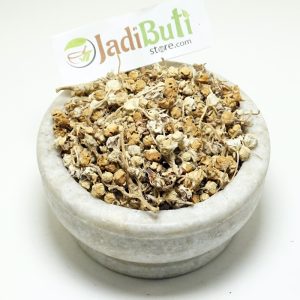
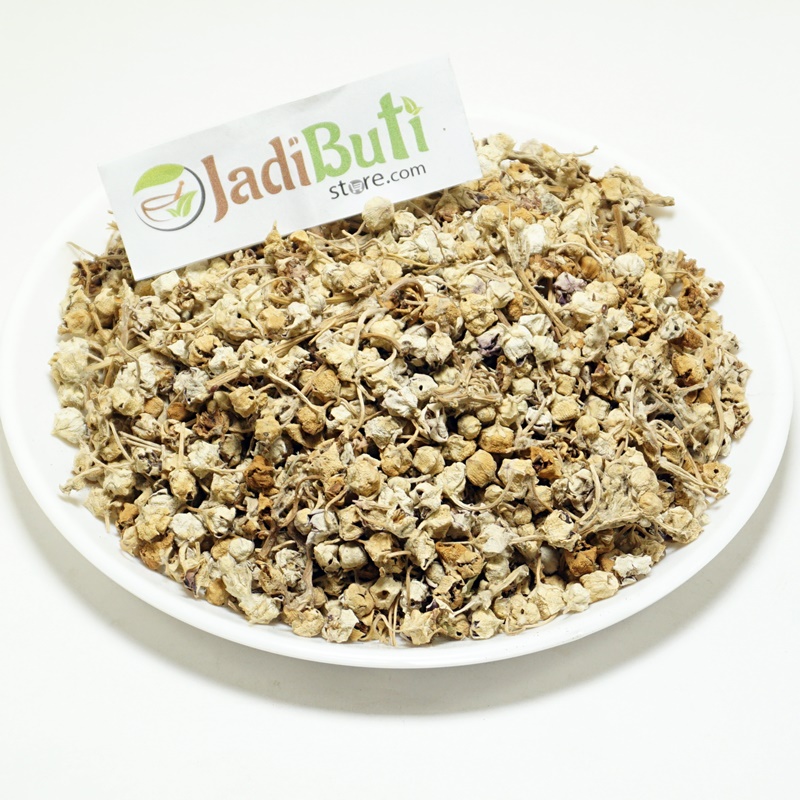
AAK – आक फूल – MADAR – Calotropis Gigantea
₹120.00 – ₹920.00Quick ViewAAK – आक फूल – MADAR – Calotropis Gigantea.
Aakra plant is 120-150 centimeters high. Mostly, it is found in forests. It is used as homeopathy medicine from the name of Calotropis Giagantea.
Aak Name In Different Languages:
Aak in English Name – Swallow-wort, Calotropis, Milkweed, Mudar, Madar Tree Calotropis gigantea
Aak in Hindi Name – Akh, Ak, Madar, Safed Aak, Arkh
Aak in Latin name – Calotropis gigantea R.Br.
Aak in Urdu Name – Aak, Madar
Aak in Arabic Name – Ushar, Ashur
Aak in Gujarati Name – Aakado, Akado, Akda, Myhara, Retoakah
Aak in Persian Name – Zahar Nak, Kharaq, Zahook
Aak in Sanskrit Name – Arka, Alarka, Surya Patra, Mandara, Ravi, Bhanu, Tapana
Bad affects removal: If someone has eaten over quantity of leaves, flowers or any other parts of calotropis and he is feeling bad effect of it, boil leaves of bastard teak (Plash) in water and give its water to him, it alleviates calotropis poisoning. If wound occurs on the body due to fall milk of calotropis, wash the affected part with above water because it provides relief in it too.
Useful in various diseases :
1. Piles:
Drip three drops calotropis milk on sugar-cake (Batasa) and take, it provides relief in piles. This process should be used before sunrise.2. Migraine:
If the pain decreases and increases with sunrise, the patient should eat sugar-cake with two drops calotropis milk before sunrise, it will provide relief soon.3. Stomachache:
Grind bark of calotropis root, sal-ammoniac, ochre and black peppers one spoon each together there after mix half spoon ground camphor in it. After that, take half spoon this mixture with lukewarm water to get relief in stomachache, constipation, diarrhoea, spleen disorders, cold, cough, fever, hepatitis and other diseases of the stomach.4. Stone:
Dissolve ten pieces flowers of calotropis with one glass milk and take it in the morning for forty days regularly, it brings stone out. -
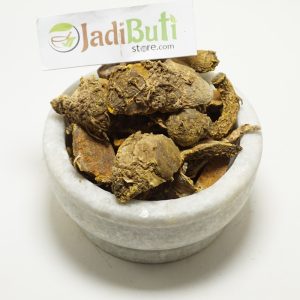
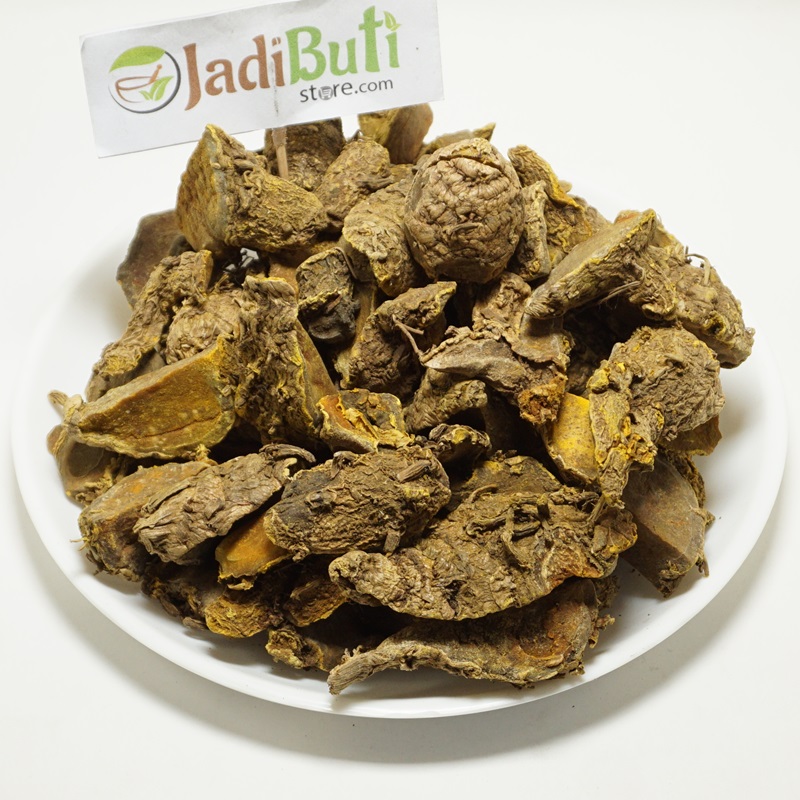
Ambahaldi – अम्बाहल्दी – Mango Ginger – Curcuma amada
₹100.00 – ₹795.00Quick ViewAamba Haldi | Curcuma amada
Ayurvedic Classification Description Rasa (taste) Sour Guna (qualities) Light, dry, sharp, and penetrating Virya (potency) Heating Vipaka (post-digestive effect) Sour Dosha effect Balances Kapha and Pitta doshas; may aggravate Vata dosha in excess Karma (actions) Anti-inflammatory, antioxidant, analgesic, digestive, carminative, and cholagogue Dhatu (tissue) affinity Works primarily on the digestive and circulatory tissues Srotas (channel) affinity Works primarily on the digestive and circulatory channels Prabhava (special effect) May help to reduce inflammation and pain Active Compound Amba Haldi Benefits Curcuminoids (Curcumin, Demethoxycurcumin, Bisdemethoxycurcumin) Anti-inflammatory, antioxidant, and immune-boosting properties alpha-Pinene Anti-inflammatory, anti-bacterial, and anti-fungal properties beta-Pinene Anti-inflammatory, anti-bacterial, and anti-fungal properties Camphene Anti-inflammatory, anti-bacterial, and anti-fungal properties 1,8-Cineole Anti-inflammatory, anti-bacterial, and anti-fungal properties Terpinen-4-ol Anti-inflammatory, anti-bacterial, and anti-fungal properties Limonene Anti-inflammatory, antioxidant, and immune-boosting properties Zingiberene Anti-inflammatory, antioxidant, and immune-boosting properties -


Jaiphal – जायफल – Nutmeg – Myristica fragrans
₹450.00 – ₹3,145.00Quick ViewJaiphal – जैफल – Nutmeg – Myristica fragrans.
Jaiphal in In Different Languages:
Jaiphal in English Name : Nutmeg & Mace
Jaiphal in Hindi Name : Jaiphal & Jawitri
Jaiphal in Latin name : Myristica fragrans Houtt.
Jaiphal in Urdu Name : Jaiphal & Jawitri
Jaiphal in Arabic Name : Jawz Bawwaa & Bisbasa
Jaiphal in Bengali Name : Jaiphal & Jaitri
Jaiphal in French Name : Muscadier & Macis
Jaiphal in German Name : Muskatnussbaum & Muskatblüte
Jaiphal in Gujarati Name : Jaiphal & Jawitri
Jaiphal in Kannada Name : Jajikai & Jaipatri
Jaiphal in Kashmiri Name : Jafal
Jaiphal in Marathi Name : Jaiphal & Jawitri
Jaiphal in Persian Name : Gauzbua & Bazbaaz
Jaiphal in Punjabi Name : Jaiphal & Jawitri
Jaiphal in Sanskrit Name : Jatiphalam & Jatipatri
- “Nutmeg is a spice derived from the seed of the nutmeg tree (Myristica fragrans), and is commonly used in cooking and baking.”
- “Nutmeg is a rich source of essential oils, including monoterpenes, sesquiterpenes, and terpenoids, which give it a warm, sweet, and slightly bitter flavor.”
- “The spice is known to have anti-inflammatory and analgesic properties, making it useful for treating pain, swelling, and discomfort.”
- “Nutmeg has been used traditionally as a natural remedy for digestive problems, such as nausea, bloating, and indigestion.”
- “Studies have shown that nutmeg has the potential to boost cognitive function, as it is believed to enhance memory and concentration.”
- “Nutmeg has been used as a natural remedy for insomnia and other sleep-related disorders, as it has a calming effect on the body and mind.”
- “The essential oils found in nutmeg have antifungal and antibacterial properties, making it useful for treating various skin infections and conditions.”
- “Nutmeg is also known to possess anti-tumor properties, and has been used as a natural remedy for certain types of cancer.”
- “Nutmeg is rich in antioxidants, which help to protect the body against oxidative stress and damage caused by free radicals.”
-

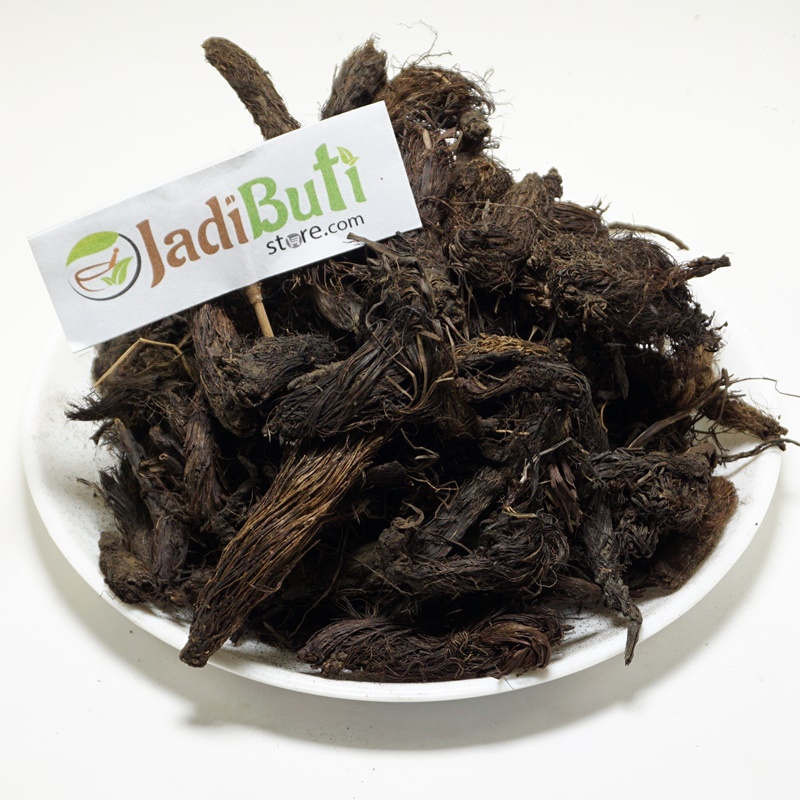
Jatamasi – जटामासी – Musk Root – Nardostachys
₹110.00 – ₹830.00Quick ViewJatamasi – जटामासी – Musk Root – Nardostachys.
Jatamasi English Name : Musk Root, Indian Spikenard
Jatamasi Hindi Name : Balcharr, Charr, Jatamashi
Jatamasi Latin name : Nardostachys
Jatamasi Urdu Name : Balcharr, Sumbul-ut-teeb
Jatamasi Sanskrit Name : Jatamansi, Mansi, Jata, Jatila
Jatamasi Arabic Name : Sunbul, Sunbul al-teeb, Sunbul Hindee, Sunbul al-’asaafeer, Nardeen
Jatamasi Bengali Name : Jatamamsi
Jatamasi Chinese Name : Gan song
Jatamasi French Name : Nard Indien
Jatamasi German Name : Achte Narde, Moschuswurzel, Sumbulwurzel
Jatamasi Gujarati Name : Baalchad, Kalichad, Jatamasi
Jatamasi Kannada Name : Bhootajata, Ganagila maste
Jatamasi Kashmiri Name : Bhut-jaat, Bhutijatt
Jatamasi Marathi Name : Jatamansi
Jatamasi Persian Name : Sumbul Hindi, Narde Hindi, Reshahwala
Jatamasi Punjabi Name : Balchhar, Chharguddi
-


Jatamasi (Medicinal) – जटामासी – Musk Root – Nardostachys
₹460.00 – ₹3,550.00Quick ViewJatamansi is used to treat a variety of conditions, including anxiety, depression, insomnia, and digestive issues. It is also used as a natural remedy for headaches, skin problems, and menstrual disorders.
Ayurvedic Property Description Rasa (Taste) Bitter, sweet, astringent Guna (Quality) Heavy, oily Virya (Potency) Cooling Vipaka (Post-digestive effect) Sweet Dosha effect Balances Pitta and Kapha doshas; may aggravate Vata dosha in excess Dhatu (Tissue) Nervous tissue (Majja dhatu), plasma (Rasa dhatu) Srotas (Channels) Nervous system, digestive system, respiratory system Karma (Actions) Calming, grounding, sedative, anti-inflammatory, digestive stimulant, nervine, cardiac tonic Active Compound Potential Benefits Valerianic acid Sedative, anxiolytic, anti-inflammatory Jatamansone Sedative, anxiolytic, anticonvulsant, neuroprotective Nardosinone Anti-inflammatory, antioxidant, hepatoprotective Nardostachone Sedative, anxiolytic, anticonvulsant, neuroprotective B-Asarone Sedative, anxiolytic, anti-inflammatory, hepatoprotective Calarene Anticonvulsant, neuroprotective -
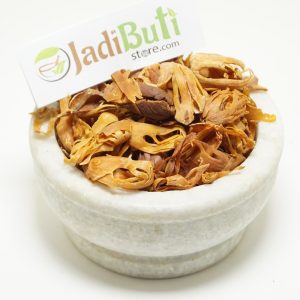
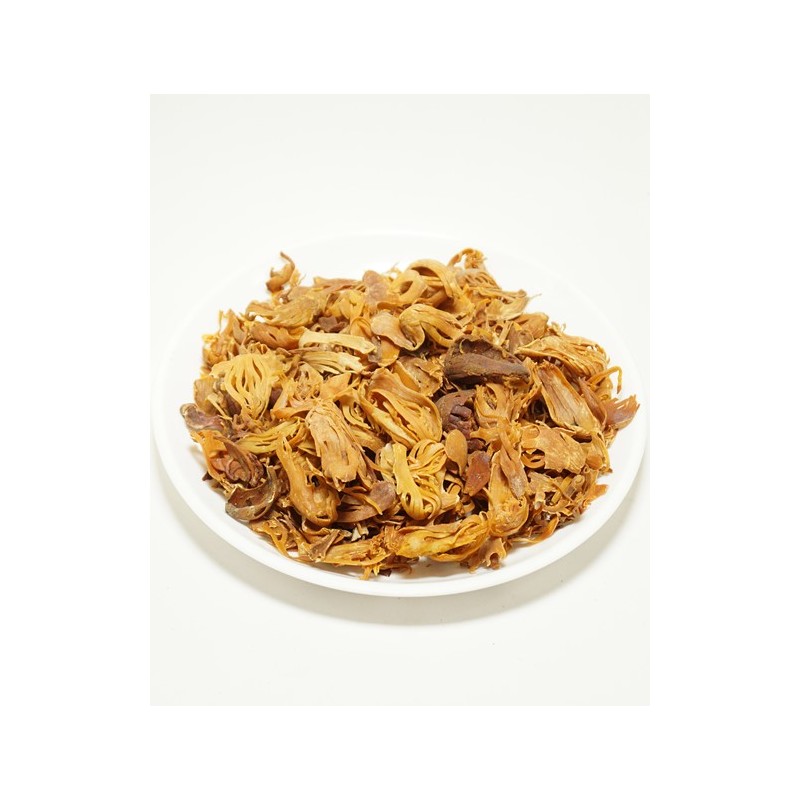
Javitri – जावित्री – Mace – Myristica fragrans
₹260.00 – ₹3,360.00Quick ViewIn Ayurvedic medicine, mace (also known as “Javitri”) is used for its various health benefits. Here are some of the potential benefits of mace:
- Supports digestive health: Mace is believed to have a positive effect on the digestive system and may help promote healthy digestion.
- May have anti-inflammatory effects: Some studies have found that mace has anti-inflammatory properties and may help reduce inflammation in the body.
- Supports healthy skin: Mace is used in various Ayurvedic skin care products due to its ability to promote healthy skin.
- Supports respiratory health: It is believed to have a positive effect on the respiratory system and may help support respiratory health.
- Supports the nervous system: Mace is believed to have a positive effect on the nervous system and may help support nerve function.
- May have antifungal properties: Some studies have found that mace has antifungal properties and may help prevent the growth of fungi.
- Hindi: Javitri
- Bengali: Jaiphal
- Marathi: Jayaphal
- Tamil: Japathri
- Telugu: Japathri
- Kannada: Japatri
- Malayalam: Jathipathri
- Persian: Jafari
- Sanskrit: Jatiphala
-
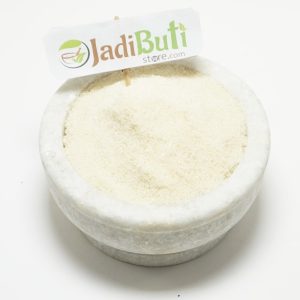
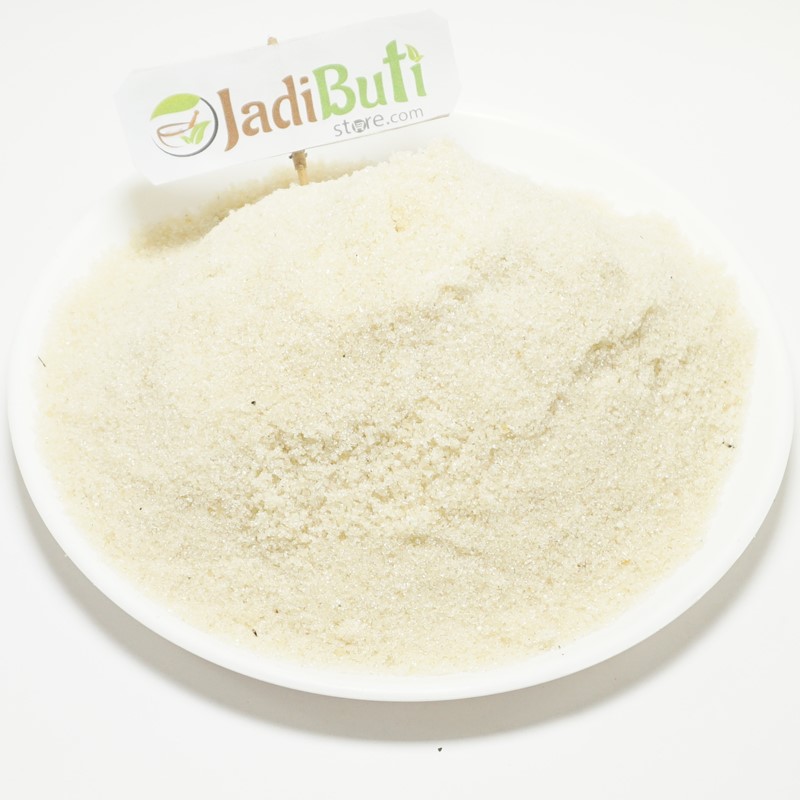
Kachi khand (Organic) – कच्ची खांड – Candy sugar – Desi Khand
₹155.00 – ₹635.00Quick ViewKhandsari sugar, Kachchi Khand is typically brown or golden in color, Cold in Potency and has a granular texture. It is commonly used in Indian cuisine to sweeten desserts and beverages, and is also used in the production of traditional medicines.
In recent years, there has been a growing interest in Khandsari sugar as a healthier alternative to refined sugar. It is believed to be more nutritious and contain more minerals and antioxidants than refined sugar, and it has a lower glycemic index, which means that it does not cause a rapid spike in blood sugar levels.
-
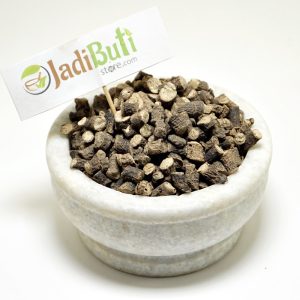

Kali musli – काली मूसली – Black Musale – Curculigo Orchioides
₹150.00 – ₹1,270.00Quick ViewKali musli | Black Musale | Curculigo Orchioides.
Ayurvedic classification of Kali Musli (Curculigo orchioides):
Ayurvedic Classification Description Rasa (taste) Bitter, astringent, and sweet Guna (qualities) Light, dry, sharp, and rough Virya (potency) Heating Vipaka (post-digestive effect) Sweet Dosha effect Pacifies Kapha and Vata doshas Karma (actions) Aphrodisiac, rejuvenating, tonic, diuretic, and digestive Dhatu (tissue) affinity Works primarily on the reproductive and nervous tissues Srotas (channel) affinity Works primarily on the reproductive and urinary channels Prabhava (special effect) Increases desire and performance Active compounds and their benefits found in Kali Musli (Curculigo orchioides):
Active Compound Benefits Curculigoside Aphrodisiac, antioxidant, and anti-inflammatory properties Phenols Antioxidant and anti-inflammatory properties Flavonoids Antioxidant and anti-inflammatory properties Saponins Anti-inflammatory, immune-modulatory, and anti-tumor properties Triterpenoids Anti-inflammatory, anti-diabetic, and anti-tumor properties Alkaloids Antioxidant and neuroprotective properties -
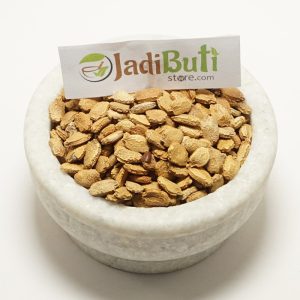

Karela Seeds – करेला बीज – Bitter Gourd – Momordica Charantia
₹90.00 – ₹690.00Quick View- Karela beej is considered to have a bitter taste (rasa) and a cooling energy (virya) in Ayurveda.
- It is traditionally used as a natural remedy to help control blood sugar levels, particularly in people with diabetes. The seeds contain compounds that can help to increase insulin sensitivity and reduce insulin resistance.
- Karela beej is also used to support digestive health and alleviate various digestive disorders, including constipation, indigestion, and stomach pain.
- It is believed to have immunomodulatory properties, meaning it can help to regulate and balance the immune system.
- Karela beej is traditionally used to support liver health and protect the liver against damage.
- It has also been used in Ayurveda to promote skin health and reduce skin inflammation and infections.
- Karela beej is often prescribed in Ayurvedic formulations to help manage obesity and promote weight loss.
Overall, karela beej is a versatile and beneficial herb that has been used for centuries in Ayurvedic medicine. It is known for its ability to support blood sugar control, digestive health, immune system function, and liver health. However, it is important to consult a qualified Ayurvedic practitioner before using karela beej or any other herbal remedy for medicinal purposes.
-


Kaunch Kale – कौंच काले – Cowhage – Mucuna Pruriens Black
₹130.00 – ₹1,095.00Quick ViewKale Kauch Beej (Mucuna Pruriens) is classified as follows:
Ayurvedic Property Classification Rasa (taste) Madhura (sweet), Tikta (bitter) Guna (qualities) Guru (heavy), Snigdha (unctuous or oily) Veerya (potency) Ushna (hot) Vipaka (post-digestive effect) Madhura (sweet) Dosha Balances Vata and Pitta doshas, may increase Kapha dosha in excess Prabhava (special action) Nervous system and reproductive system support Active Compound Function L-Dopa Precursor to dopamine, helps regulate mood, movement, and motivation Serotonin Regulates mood, appetite, sleep, and digestive function Adrenaline and noradrenaline Regulate the body’s stress response Acetylcholine Regulates memory and learning Antioxidants (flavonoids and phenols) Protect cells from oxidative damage, may have anti-aging effects -
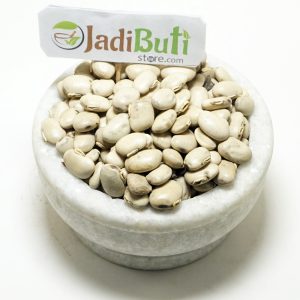
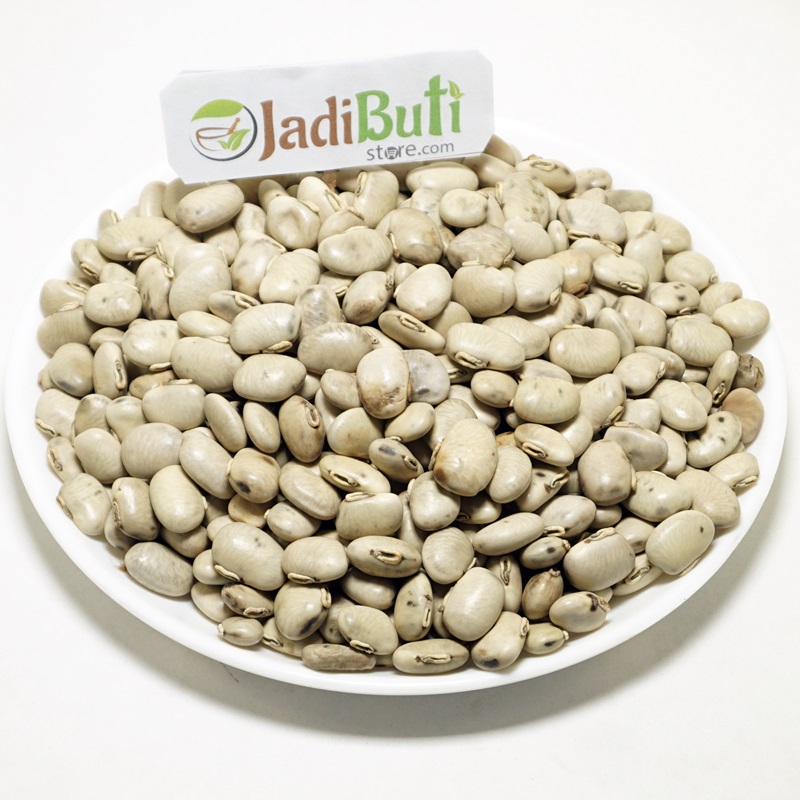
KAUNCH SEEDS WHITE – सफ़ेद कॉंच – Cow Hage – Mucuna pruriens Baker
₹110.00 – ₹875.00Quick View- Kaunch beej safed is considered an excellent rasayana (rejuvenator) and is believed to enhance overall vitality and longevity.
- Kaunch beej safed is traditionally used to improve fertility and wellness function, particularly in men.
- Kaunch beej safed is believed to support the nervous system and improve cognitive function, memory, and concentration.
- Kaunch beej safed is used to support respiratory health and relieve respiratory conditions such as cough, asthma, and bronchitis.
- Kaunch beej safed is considered beneficial for digestive health and can improve digestion, relieve constipation, and reduce bloating and flatulence.
- Kaunch beej safed is believed to have a positive effect on mood, reducing stress and anxiety and promoting relaxation and mental clarity.
Overall, Kaunch beej safed is a valued herb in Ayurveda, known for its ability to support overall health and well-being. It is used to treat a wide range of conditions and is believed to be particularly beneficial for reproductive, nervous, respiratory, and digestive health.
-

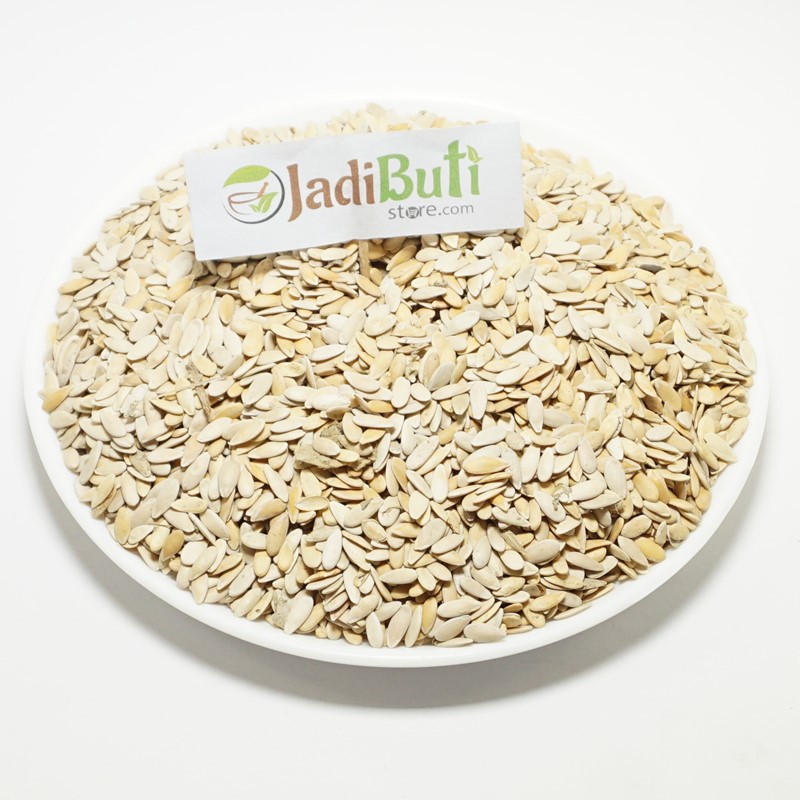
Kharbuja beej (With shell) – खरबूजा बीज – Muskmelon Seed – cucumis melo
₹90.00 – ₹690.00Quick ViewIn Ayurveda, muskmelon seeds are classified as “Shita Virya” and “Madhura Rasa.”
- Rasa (taste): Muskmelon seeds are said to have a sweet taste (madhura rasa).
- Virya (energy): They are cooling in nature (shita virya).
- Vipaka (post-digestive effect): They have a sweet post-digestive effect (madhura vipaka).
- Guna (quality): They are light and dry in quality (laghu and ruksha guna).
- Dosha effect: Muskmelon seeds are believed to pacify Pitta dosha, but can aggravate Kapha dosha if consumed in excess.
Shita Virya refers to foods or herbs with cooling properties, and muskmelon seeds are believed to have a cooling effect on the body. They are recommended for people who have excess heat in their body, as they can help to reduce inflammation, acidity, and heartburn.
Madhura Rasa refers to the sweet taste, and muskmelon seeds are believed to have a sweet taste. According to Ayurveda, sweet taste promotes healthy tissue growth, soothes the mind, and supports the digestive system.
Overall, the cooling and sweet properties of muskmelon seeds make them a popular choice in Ayurveda for promoting good health and treating various conditions.
